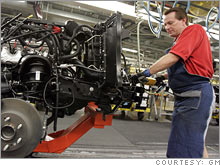UAW members on job at GM as talks continueUnion and GM negotiators return to the table Monday morning as contract extension keeps plants open.NEW YORK (CNNMoney.com) -- Members of the United Auto Workers union reported to work at General Motors plants Monday morning as negotiators continue to seek a new labor agreement more than two days after their old contract expired. Bargainers had another marathon negotiating session Sunday night before breaking at about 3 a.m. ET Monday, according to GM spokesman Tom Wickham. Talks resumed late Monday morning. A union spokesman was not available for comment.
The union has not announced a formal extension of the contract with GM meaning a strike could still start at any time. But the informal hour-to-hour extension at GM has held off any work stoppage at the nation's No. 1 automaker. Monday will be the first full day of production at GM since the contract deadline Friday night - only two plants were scheduled to be in operation Sunday and one of those only resumed work late in the day. GM said only that work resumed at the UAW-represented plants "without incident." Shares of GM (Charts, Fortune 500), which gained last week on hopes that a cost-cutting contract would be reached, were up about about 1.6 percent in early afternoon trading Monday on reports of continued talks. Talks at Ford and Chrysler moved to the backseat last Thursday when the union designated GM to be its target, meaning it will try to reach an agreement with GM first that would set a pattern for deals at the other two automakers. The union granted a more formal contract extension to Ford and Chrysler at that time, which requires at least three days notice from either side to end the extension. Ford (Charts, Fortune 500) shares were up 4 percent in trading in Frankfurt Monday. Chrysler does not have any publicly traded shares since it was sold by DaimlerChrysler (Charts) last month to private equity firm Cerberus Capital Management. GM spokespeople where limited in their comments early Monday, saying only what time negotiations broke off Monday and that they were expected to resume at some point Monday morning. Sources reported over the weekend that UAW President Ron Gettelfinger and GM Chairman and CEO Rick Wagoner were directly involved in the marathon bargaining sessions throughout the weekend, and there was one report that the union was close to calling for a strike during the marathon session Friday night that continued until 4:30 a.m. Saturday. A long strike by the nearly 73,000 UAW members still working at GM could cripple efforts of automaker to stem nearly three years of losses in its North American auto operations. While experts said they believe it would be able to weather a short strike, there was concern that once a strike started, an agreement could become more difficult to reach. The union leadership has shown a willingness to work with GM to change its cost structure, but an agreement on a new way to pay for retiree health care, the major negotiating priority of management, has been elusive. While GM has far fewer UAW members still on the job after a round of staff buyouts and plant closings over the last two years, it also has nearly 270,000 retirees and another 70,000 surviving spouses whose health care coverage is covered under the existing union contract. Those promises cost an estimated $51 billion more than GM has set aside to pay for those costs, which has put GM and its other U.S. rivals at a severe competitive disadvantage compared to nonunion rivals such as Toyota Motor (Charts) and Honda Motor (Charts). And that drag on earnings makes it difficult for the U.S. automakers to pay for development of the next generation of cars and trucks. Together the Big Three U.S. automakers have nearly $100 billion in unfunded liabilities related to retiree health care costs, according to an estimate from rating agency Standard & Poor's. Management is seeking to set up a union-controlled trust fund to assume those costs. Negotiations have focused on how much cash, stock and corporate debt the automakers would have to put in the trust funds to cover those obligations. While GM faces the greatest costs for retiree health care, it also has made more progress than its U.S. revivals in returning to profitability. It saw its North American auto operations post a narrow profit in the second quarter, the first time it has done so since 2005, although a full-year loss is likely even if it avoids a strike. GM also has had stronger sales than its U.S. rivals this year, although a much better-than-expected sales month in August still left GM with year-to-date U.S. sales nearly 8 percent below 2006 levels. If the GM workers go on strike, it would be the nation's largest strike since 87,000 workers at Verizon (Charts, Fortune 500) walked off the job in August 2000, but that action did not shut down the company. GM was last hit by a strike at its Flint, Mich., locals in 1998, a work stoppage by only 9,200 workers that was felt across most of GM's North American operations since they couldn't get the parts they needed to keep making cars and trucks. The last strike by more than 70,000 workers that shut down a company's operations was the 1997 strike by 185,000 Teamsters at United Parcel Service (Charts, Fortune 500). |
Sponsors
|

